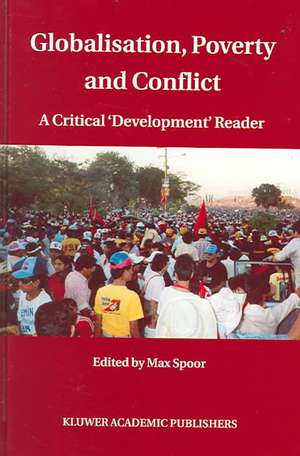Globalisation, Poverty and Conflict: A Critical 'Development' Reader
Editat de Max Spooren Limba Engleză Hardback – 21 sep 2004
The authors in this edited volume discuss these inter-related and highly controversial topical elements of development in a number of chapters organised around three sets of issues: (1) globalisation, inequality and poverty; (2) governance, civil society and poverty; and (3) resource degradation, institutions and conflict. The contributions represent current thinking on (and practice of) development policy, poverty reduction, the need for multi-level democratic institutions, and the containing and prevention of conflicts. The authors confront the predominant mainstream ideas on ‘development’ and propose alternatives.
The chapters, written by a select group of scholars and development practitioners, will be of direct interest to those involved in this field of social sciences and in ‘development practice’, but they are composed in such a way as to remain accessible for the generallyinterested reader.
| Toate formatele și edițiile | Preț | Express |
|---|---|---|
| Paperback (1) | 947.85 lei 6-8 săpt. | |
| SPRINGER NETHERLANDS – 19 oct 2010 | 947.85 lei 6-8 săpt. | |
| Hardback (1) | 954.14 lei 6-8 săpt. | |
| SPRINGER NETHERLANDS – 21 sep 2004 | 954.14 lei 6-8 săpt. |
Preț: 954.14 lei
Preț vechi: 1163.58 lei
-18% Nou
Puncte Express: 1431
Preț estimativ în valută:
182.57€ • 190.62$ • 151.10£
182.57€ • 190.62$ • 151.10£
Carte tipărită la comandă
Livrare economică 04-18 aprilie
Preluare comenzi: 021 569.72.76
Specificații
ISBN-13: 9781402028571
ISBN-10: 1402028571
Pagini: 368
Ilustrații: XXVI, 340 p.
Dimensiuni: 156 x 232 x 25 mm
Greutate: 0.69 kg
Ediția:2004
Editura: SPRINGER NETHERLANDS
Colecția Springer
Locul publicării:Dordrecht, Netherlands
ISBN-10: 1402028571
Pagini: 368
Ilustrații: XXVI, 340 p.
Dimensiuni: 156 x 232 x 25 mm
Greutate: 0.69 kg
Ediția:2004
Editura: SPRINGER NETHERLANDS
Colecția Springer
Locul publicării:Dordrecht, Netherlands
Public țintă
Professional/practitionerCuprins
Globalisation, Inequality and Poverty.- From Exclusive to Inclusive Development.- Collateral Damage or Calculated Default? The Millennium Development Goals and the Politics of Globalisation.- Can Improved Human Development Policies Break the Cycle of Poverty?.- Inequality, Poverty and Conflict in Transition Economies.- Globalisation, Marginalisation and Conflict.- The Slow Progress of International Financial Reform.- The Debt Crisis and the South in an Era of Globalisation.- Resource Degradation, Institutions and Conflict.- Multi-Level Governance and Resilience of Social-Ecological Systems.- In Conclusion.- Knowledge Sharing in Support of Human Development.- Disempowering new Democracies and the Persistence of Poverty.- Local Governance and Rural Poverty in Africa.- Local Governance Hybrids: Enabling Policies and Citizen Approaches to Poverty Reduction.- Civic Engagement, Social Accountability and The Governance Crisis.- Blurring The State-Private Divide: Flex Organisations and The Decline of Accountability.- The Limits of Institutions: Environmental Degradation and Knowledge Framing.- Beyond State-Community Polarisations and Bogus “Joint”Ness: Crafting Institutional Solutions for Resource Management.
Recenzii
From the reviews:
"The book, a collection of 16 chapters grouped into three parts, gives a thorough and interesting review and discussion of contemporary development issues from a global perspective. … Although the book is targeted at readers in the field of social sciences, it is well written in a clear and simple manner so that it can find appeal to a wide audience, ranging from policy makers, academics to students and development practitioners." (Shephard Siziba, Quarterly Journal of International Agriculture, Vol. 45 (4), 2006)
"The book, a collection of 16 chapters grouped into three parts, gives a thorough and interesting review and discussion of contemporary development issues from a global perspective. … Although the book is targeted at readers in the field of social sciences, it is well written in a clear and simple manner so that it can find appeal to a wide audience, ranging from policy makers, academics to students and development practitioners." (Shephard Siziba, Quarterly Journal of International Agriculture, Vol. 45 (4), 2006)
Notă biografică
Max Spoor is Associate Professor and Coordinator of the Centre for the Study of Transition and Development (CESTRAD), Institute of Social Studies, The Hague, The Netherlands, and Extraordinary Professor, Centre of International Relations and International Cooperation (CIDOB), Barcelona, Spain.
Caracteristici
Critical analysis confronts the currently fashionable, mainstream neo-liberal tendency, founded in the "Washington Consensus" on "development" Solid arguments and overwhelming evidence to sustain the critical analysis A group of high-level and well-known scholars and development practitioners provide state-of-the-art contributions, creating a new critical "development" reader















